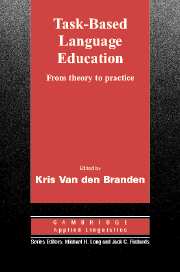Book contents
- Frontmatter
- Contents
- Acknowledgements
- Series Editors' Preface
- Chapter 1 Introduction: Task-based language teaching in a nutshell
- Chapter 2 From needs to tasks: Language learning needs in a task-based approach
- Chapter 3 Tasks for absolute beginners and beyond: Developing and sequencing tasks at basic proficiency levels
- Chapter 4 Developing language tasks for primary and secondary education
- Chapter 5 Task-based language teaching in science education and vocational training
- Chapter 6 Task-based language teaching and ICT: Developing and assessing interactive multimedia for task-based language teaching
- Chapter 7 Developing and introducing task-based language tests
- Chapter 8 The role of the teacher in task-based language teaching
- Chapter 9 A box full of feelings: Promoting infants' second language acquisition all day long
- Chapter 10 Training teachers: Task-based as well?
- References
- Subject Index
- Name Index
Chapter 7 - Developing and introducing task-based language tests
Published online by Cambridge University Press: 05 May 2010
- Frontmatter
- Contents
- Acknowledgements
- Series Editors' Preface
- Chapter 1 Introduction: Task-based language teaching in a nutshell
- Chapter 2 From needs to tasks: Language learning needs in a task-based approach
- Chapter 3 Tasks for absolute beginners and beyond: Developing and sequencing tasks at basic proficiency levels
- Chapter 4 Developing language tasks for primary and secondary education
- Chapter 5 Task-based language teaching in science education and vocational training
- Chapter 6 Task-based language teaching and ICT: Developing and assessing interactive multimedia for task-based language teaching
- Chapter 7 Developing and introducing task-based language tests
- Chapter 8 The role of the teacher in task-based language teaching
- Chapter 9 A box full of feelings: Promoting infants' second language acquisition all day long
- Chapter 10 Training teachers: Task-based as well?
- References
- Subject Index
- Name Index
Summary
Assessment occupies a prominent place in education. In a broad sense, the term ‘assessment’ may refer to virtually any action that is taken in order to assess learners' progress and their current skills, knowledge and attitudes. Assessment may, among other things, include observations, think-aloud protocols, self-assessment, peer assessment, portfolio assessment (all commonly covered by the term ‘alternative testing’) (Brown & Hudson, 1998; Bultynck, 2004; Genesee & Upshur, 1996; Van Petegem & Vanhoof, 2002) and the use of more ‘classical’ tests. This chapter focuses on the latter: tests that aim to measure to what extent a language learner can perform certain language tasks at a particular moment in time. The limited focus of this chapter is warranted by the fact that tests still constitute the bulk of most teachers' assessment practices around the world. Nevertheless, most of the ideas and principles we will advocate in this article can also be applied to assessment in the broader sense.
In an educational setting, tests are tightly linked to learning goals on the one hand, and the educational programme on the other (see also Chapter 1 in this volume). The relations between goals, tests and the educational programme are multidirectional. On the one hand, goals constitute the crucial point of departure for both education (curriculum design, choice of methodology, etc.) and testing.
- Type
- Chapter
- Information
- Task-Based Language EducationFrom Theory to Practice, pp. 151 - 174Publisher: Cambridge University PressPrint publication year: 2006
- 7
- Cited by

